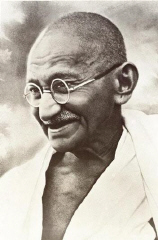As anti-war protesters gear up for demonstrations around the US, decrying the possible build-up of American troops in Iraq, I was reminded of the anniversary of the assassination of one of the greatest  advocates of non-violence of all time. On January 30th, 1948, after five unsuccessful attempts, Mahatma Gandhi was murdered by Hindu extremists. No doubt, many of the protesters around the US invoke the spirit of Gandhi — and other iconic pacifists — in seeking an end to war.
advocates of non-violence of all time. On January 30th, 1948, after five unsuccessful attempts, Mahatma Gandhi was murdered by Hindu extremists. No doubt, many of the protesters around the US invoke the spirit of Gandhi — and other iconic pacifists — in seeking an end to war.
But is non-violence a reasonable philosophy? Or are its proponents destined, like Gandhi, to be silenced by the mad and/or powerful?
I was recently in discussion with an advocate of non-violence and asked the simple question: Do you lock your house at night? They immediately sniffed out my train of thought and got huffy. “That’s different!†But is it? How does the belief in non-violence practically address — much less survive in — a violent world? How do sit-ins, peace marches and negotiations work with criminals and assassins? At some point, car  alarms, pepper spray and tazers seem a reasonable accessory.
alarms, pepper spray and tazers seem a reasonable accessory.
And if it’s true on the level of home security, it’s true on the level of homeland security.
This is why I just don’t get it. Surely those who hold to non-violence allow for self-defense, right? I was stunned to learn that, when asked about resistance to the Nazis, Gandhi believed the Jews should have prepared to sacrifice their collective lives in non-violence. His statements are both shocking and honorable: Shocking in the sense of their utter impotence against evil; honorable in the sense that he has followed his convictions to their logical — albeit, absurd — conclusion.
George Orwell, quite the anti-pacifist, once wrote, “If you are not prepared to take a life, you must often be prepared for lives to be lost in some other way.” This is why he equated Gandhi’s solution as “collective suicide.”
An honest adherent of non-violence must prepared to sacrifice far more lives than she saves.
 Only the genuinely evil want war, but even Scripture says there is a time for it (Ecclesiastes 3:1-8). The Prince of Peace has 12 legions of angels at His disposal (Matthew 26:53) and, before the credits roll, He uses them. According to the Bible, our age culminates, not in a celestial sit-in, but an all-out brawl (see, Armageddon). For all those advocates of non-violence who claim Christ as their guru, seeing Him at the forefront of the army of God should be disheartening.
Only the genuinely evil want war, but even Scripture says there is a time for it (Ecclesiastes 3:1-8). The Prince of Peace has 12 legions of angels at His disposal (Matthew 26:53) and, before the credits roll, He uses them. According to the Bible, our age culminates, not in a celestial sit-in, but an all-out brawl (see, Armageddon). For all those advocates of non-violence who claim Christ as their guru, seeing Him at the forefront of the army of God should be disheartening.
Diplomacy and demonstration have their place. But turning the other cheek does not necessarily mean offering our cheeks to be slapped, nor closing our eyes to those who also want our heads. On the surface, non-violence may appear noble — even trendy. But in the end, it’s suicidal.
So as for me and my house, we shall lock our doors.














and set my alarm.
we cannot eat from the tree of the knowledge of good and evil without evil existing. what a harsh slap of reality when adam and eve were thrown out of pure and perfect communion with God to endure pain and labor to then watch one son kill the other. i am amused that even by that time there were enough poeple on the earth that cain feared for his life, and the God of Peace placed a mark on cain to protect him and vowed terrible stuff to anyone who did.
what they want is heaven … may they find their way there.
Gandhi was not a Christian. He was actually an anti-Christian bigot who made critical remarks about Christians. Anyone that would take an anti-Christian bigot’s statement and act like it is something to be followed is a fool and strenghens the anti-Christian bigot’s arm.
Ease up, Rev! Hinduism is diametrically opposed to Christianity — you’re right about that. But Gandhi was not hostile to Christians. If anything, he attempted to synthesize biblical principles with his pacifism… insofar that it served his purposes. But to say he was “an anti-Christian bigot” is a bit of a stretch.
Pacifism is one thing. Non-violence is not necessarily the same (though, yes, in Gandhi’s case it was).
Not all the Iraq War protesters, for instance, are pacifists. But they use non-violent methods (Gandhi-esque) to promote their cause. Taking up arms against the government in protest of the war would be the suicidal thing.
Appreciate your post and your thoughts. Thanks.
Hey, Chris, I appreciate you dropping by. (Do the folks at FiF know you’re in the bad part of the blogosphere?) I suppose I should have distinguished between the two, though for many, the terms are synonymous. Within both camps (the pacifist and non-violent), there are a multiplicity of divergent views, some stretching the status quo.
In the article I linked to, I found this quote by Gandhi most interesting: If there ever could be a justifiable war in the name of and for humanity, a war against Germany, to prevent the wanton persecution of a whole race, would be completely justified. Even Gandhi, with his commitment to non-violent protest, entertained the idea of “a justifiable war” — a fact which I find fascinating and, no doubt, spawns nuanced ideologies within his own camp.
Hey Chris, thanks so much for your comments. Peace. . .
I had a Sociology professor at Biola University (a conservative Christian university) tell the class that he was a pacifist. We asked him if that meant that he would not use physical violence to, using one example, protect and defend his daughter if she was going to be raped. He said that he would NOT use violence under ANY circumstances including that one. We spent that particular class period asking him many questions like those. For some reason (this was his first year at the school) I think he was surprised that we were so shocked at how far he would take his pacifism. However, we did listen.
What I found ironic about the recent protests in D.C. was that for all of their non-violence and pacifism they had little concern about defacing monuments, spitting on counter-protest folks (including one particularly well known to the media — an injured soldier named Joshua Sparling) and in general showing little regard for institutions and well, laws. If I give you credibility it’s because your behavior demands respect. You demand, by virtue of your integrity and humility, to be listened to. I’d have less of a hard time, at least listening to these folks, if they behaved, in a manner which commands my respect.
At least my Sociology prof spoke with humility. And from the depths of his conviction, he appealed to us reasonably. This goes much further in my book. And guarantees that at the least, I’ll listen and try to understand. But you spray paint my Capitol and spit in Joshua Sparling’s face and give speeches about the lack of training of our men and women in uniform and I’m likely to think you’re a loon.